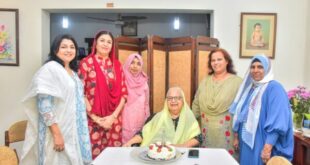The Muslims of Sri Lanka
Brief History of the Muslims of Sri Lanka
Introduction
Sri Lanka, known to the ancients as Ceylon, has been recorded in history books as a country that has had many visitations from foreign travelers throughout the ages. The people are mainly Buddhist, with a complex mixture of Hindus, Muslims, Roman Catholics and other Christian denominations. The main race, are the Sinhalese while the Tamils, Muslims and Burghers form the remaining. The Muslims of Sri Lanka are a small minority amounting to approximately 10% of a total population of 20 Million people. They claim descent from the Arab settlers of Hashemite origin, Yemeni traders and of the Berbers of Morocco and North Africa, who were visiting and trading with the Island even before the advent of Islam.
The first Sri Lankan Muslim settlement was in a port settlement in western Sri Lanka which was named Berbereen (Beruwala) in honor of the Berber traveler who founded the city, Abu Yusuf al-Barbari. This individual was also responsible for converting the nearby Maldive Islands to Islam. The Berbers are an ethnic group from North Africa, mainly from Morocco. Their attachment to tradition and Islamic values sets them apart from the Arabs and identifies them as formidable warriors in Islam next to the Turks. Famous Berbers include, General Tariq bin Ziyad, Ibn Batuta of Tangier among many others.
The second settlement in the area was in Alutgamaweedia which was subsequently named Dharga town in the 1940’s by the Muslims of that town. The grand mosque in Dharga town has archeological evidence pointing to its historical origins.
The third settlement in the region was in Weligama a town further to the south of Berberyn. This city was known by its Arab name as As-Salawat. The biggest massacre of Muslims in the island by the Portuguese was committed here at Weligama where at least 10,000 Arab soldiers and their families were slaughtered mercilessly by the Portuguese who were reknowed for their barbarity towards those who refused to convert to Christianity. A glance at the family names of the current Muslims of this region points to their noble origins. The larger settlements of Colombo (Kalembu), Galle (al-Ghali) and Matara (al-Muttrah) were established by trading families who migrated from Arab lands in the later centuries.
Sri Lankan Muslims can be categorized into two distinct sub groups, the Moors and the Malays. The former is the name given to them by the Portuguese colonial rulers who used the word Moros to identify Arabs in general. The Malays are a group of Muslims who originated from Java and the Malaysian Peninsula. They differed from the Moors, both, in their physical appearance as well as in the language they spoke which was a mixture of Malay and local dialects.
The Muslims of Sri Lanka have a colorful history behind them punctuated by a long spell of hardship suffered during the Portuguese and Dutch occupation of the Island. It is much to their credit that they withstood the onslaught of economic constraints, political intrigues and religious persecution to stay behind and survive. Most other peoples may have packed their bags and left for good. They not only saved their religion from the Christian enemies but also rebuilt the economy, slowly and steadily, by the 18th century when the British took over control of the island from the Dutch.
Being geographically isolated from the main centers of Islamic culture and civilization the Muslims of Sri Lanka were forced to interact closely with their neighbors, the Muslims of South India, in order to preserve their identity. Had they been denied this slender link, it is possible that, they may have lost their distinct Islamic character completely. However, it must be observed that this link has also caused many Indian (Hindu) traditions and rituals to creep into their culture and life style, some of which, even though vehemently anti-Islamic, are still practiced to date. Lack of a correct understanding of the teachings of Islam has been the main cause of this sad situation.
Having adapted to the local conditions in various ways and also contributing largely to the Islands economic prosperity, the Muslim community of Sri Lanka, unlike the Hindu Tamils of the Northern Province, has saved itself from any major clash with the indigenous Sinhalese population. They have also been able to receive a fair share in the country’s Politics and Administration by virtue of their hard work and also of being an important minority whose support has been vital to all the political groups in the country. Although it may be said that the Muslim community was not politically dominant at any stage, yet, it is certainly true that they maneuvered their political activity without much noise, unlike the Tamils.
This work attempts to present a brief history of the Muslims of Sri Lanka from their early Arab trader beginnings to the present day minority community that is fully integrated into the Sri Lankan society.
Please Click here to read the complete Article
Post Disclaimer | Support Us
Support Us
The sailanmuslim.com web site entirely supported by individual donors and well wishers. If you regularly visit this site and wish to show your appreciation, or if you wish to see further development of sailanmuslim.com, please donate us
IMPORTANT : All content hosted on sailanmuslim.com is solely for non-commercial purposes and with the permission of original copyright holders. Any other use of the hosted content, such as for financial gain, requires express approval from the copyright owners.
 Sri lanka Muslims Web Portal Sri Lanka Muslims News Center
Sri lanka Muslims Web Portal Sri Lanka Muslims News Center
 Donate
Donate


